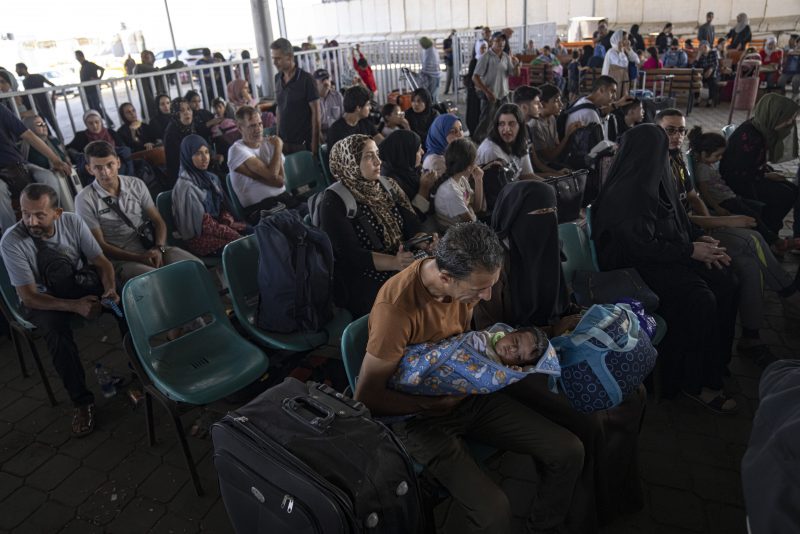

OAN’s Elizabeth Volberding
6:00 PM – Thursday, November 2, 2023
Around 400 United States citizens have been approved to leave Gaza through the Rafah border with Egypt, along with hundreds more civilians.
Advertisement
On Thursday, 400 Americans will now have the ability to leave Gaza as the Israel-Hamas conflict continues.
This marks the first major departure of civilians from the Gaza Strip since the conflict between Israel and the terrorist group Hamas broke out on October 7th. The evacuation will reportedly allow around 400 Americans and other foreign passport holders to leave the region this week.
State Department spokesperson Matthew Miller announced on Wednesday that the department has been in contact with approximately 400 Americans who have “expressed their desire to leave.”
Miller added that with their family members included, the total amount is at about 1,000.
Along with Americans, there are many people from Mexico, Hungary, Croatia, South Korea, Azerbaijan, Greece, Chad, Bahrain, Italy, Switzerland, North Macedonia, Sri Lanka, the Netherlands, and Belgium.
The department has been in the process of assigning U.S. citizens that are in Gaza with specific departure dates and times. Authorities stated that they will inform those in Gaza who have been in recent communication with the department.
Those crossing over the border gates consisted of 335 foreign passport holders, mostly Palestinian dual nationals and some foreigners, 76 critically injured patients headed for Egyptian hospitals, and staff members from aid organizations like Doctors Without Borders, the International Committee of the Red Cross, and the United Nations agency for Palestinian refugees.
U.S. citizens who spoke with reporters shared that they are both “happy and exhausted” to have the ability to leave the Gaza Strip after almost a month of attacks and bombardments, but they are also frightened for family and loved ones who will be left behind.
Haneen Okal, a mother of three, is listed as one of the American passport holders that have been authorized to leave Gaza.
“We can’t describe our feelings of getting evacuated,” Okal told reporters as she waited at the Rafah border crossing on Thursday. “But we’re still sad because of what’s happening in Gaza. The war is still there.”
“I left my two sisters, my two brothers, and my mom and my dad,” Okal added. “My mom and my dad do have American citizenship, but they don’t want to leave my other family members, so hopefully we can get them all out of there as soon as we can. It’s a disaster. There is a lack of food, electricity, power, no internet in there, bombing is all over. It’s not safe at all. I don’t know when this situation will end, but it’s really a disaster there.”
Additionally, Pediatrician Dr. Barbara Zind of Grand Junction, Colorado, traveled to Gaza as part of a humanitarian mission in early October. However, she was stranded there for almost a month due to the ongoing war.
When she was finally able to cross the Rafah border, she described it as a “chaotic” process.
“There was chaos at the first door where people were asked to wait to listen for their name to be called,” Zind said. “And then you go into this other waiting room, and there was just chaos.”
Additionally, Zind stated that it took almost 12 hours for her and her colleagues to leave Gaza and have the ability to cross into Egypt. Zind is planning to fly home on Thursday evening.
On Thursday, a family from Massachusetts managed to leave Gaza. Abood Okal, his spouse Wafaa Abuzayda, and their 1-year-old child encountered difficulties finding clean drinking water and were turned away on multiple occasions after attempting to depart from the region.
“They’re very happy to make it out,” Boston attorney Sammy Nabulsi said in support of the family. “They’re exhausted. They’re drained, they’re emotionally and physically drained. They’re also worried. They still have family behind in Gaza.”
The United States has declared that Hamas is to blame for not allowing civilians to leave Gaza, claiming that the terrorist organization intended to use the civilians as “human shields.”
The humanitarian crisis in Gaza is intensifying due to limited access to fuel, water, and medical supplies, prompting a growing worry for the United Nations and other organizations that work in the region.
Stay informed! Receive breaking news blasts directly to your inbox for free. Subscribe here. https://www.oann.com/alerts





Be the first to comment